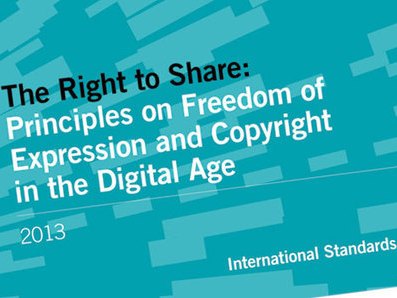Over the last ten years there has been an alarming expansion of copyright claims at the expense of human rights protection. The Right to Share Principles show that freedom of speech and the free flow of information and ideas should not and cannot be marginalised by claims to property.
On 25 April 2013, the eve of the World Intellectual Property Day, ARTICLE 19 launches The Right To Share: Principles on Freedom of Expression and Copyright in the Digital Age (Right to Share Principles), a ground-breaking document that aims to guide policy makers, legislators, judiciary and civil society on how to balance the right to freedom of expression and copyright.
The Right to Share is accompanied by a new global map documenting copyright laws worldwide.
The Right to Share Principles – developed in cooperation with high-level experts from around the world – seek to establish a framework, which can be used to ensure that the right to freedom of expression and the ability to share knowledge and culture are protected from increasing and excessive copyright interests in the digital age. The Principles also seek to promote positive measures that foster the free flow of information and ideas and allow greater access to information, knowledge and culture on the Internet and beyond.
“The tension between the right to freedom of expression and copyright is not new. However, over the last ten years, we have seen an alarming expansion of copyright claims at the expense of human rights protection. The Right to Share Principles show that freedom of speech and the free flow of information and ideas should not and cannot be marginalised by claims to property,” comments Agnes Callamard, Executive Director of ARTICLE 19.
“As part of a series of recommendations, lawmakers should consider scrapping criminal sanctions for non-commercial copyright infringement. It is entirely disproportionate that millions of internet users worldwide face the threat of criminal punishment for personal use of copyrighted material where they seek no commercial gain. Copyright law must keep pace with technological and social change and not stifle creativity in the name of protecting it” added Callamard.
REACTION TO THE RIGHT TO SHARE PRINCIPLES
Experts and activists who participated in the drafting of the Principles comment:
“Copyright has become a crucial issue for the defence of free speech as its enforcement has consistently trampled free communications on the Internet over the last decade,” said Jérémie Zimmermann spoke-person for La Quadrature du Net (France).
“Not-for-profit sharing, reuse and transformation of copyrighted works – remix – has become a means of expression for the online generations and has an immense positive value for our society as a whole. Copyright regimes must be profoundly reformed to allow for free speech online. The work initiated by ARTICLE 19 goes encouragingly in such direction” Zimmermann added.
“We, at Access Now, see the Internet as a globally shared resource, a platform that has enabled citizens around the world to freely express themselves on an unprecedented level. Access to culture, freedom of communication, freedom of expression and privacy are key to enabling the ability of citizens to fully participate in society, and it is absolutely critical that policies and practices that seek to protect copyright do not infringe these fundamental rights,” commented Raegan MacDonald, Senior Policy Analyst at Access Now (USA).
“The largest numbers of sites blocked by the Indian ISPs are a result of requests by entertainment companies. These requests have not been found to have been infringing by any court anywhere in India or elsewhere” said Pranesh Prakash, Policy Director for Centre for Internet and Society (India).
“The Principles laid out in this document are much-needed. Not only are they grounded in free speech jurisprudence, they are at times bold too: calling for a reform of international copyright law in places where it unreasonably burdens freedom of expression” added Prakash.
THE WAY FORWARD:
The Right to Share Principles are action and policy oriented and address issues such as protection of personal enjoyment of cultural goods and protection of public domain, recommendations include calling for:
The decriminalisation of non-commercial copyright infringement;
An appropriate regime for copyright enforcement in the digital environment;
Comprehensive measures for promoting access to knowledge and culture;
Human rights assessment of all trade treaties dealing with copyright protection.



